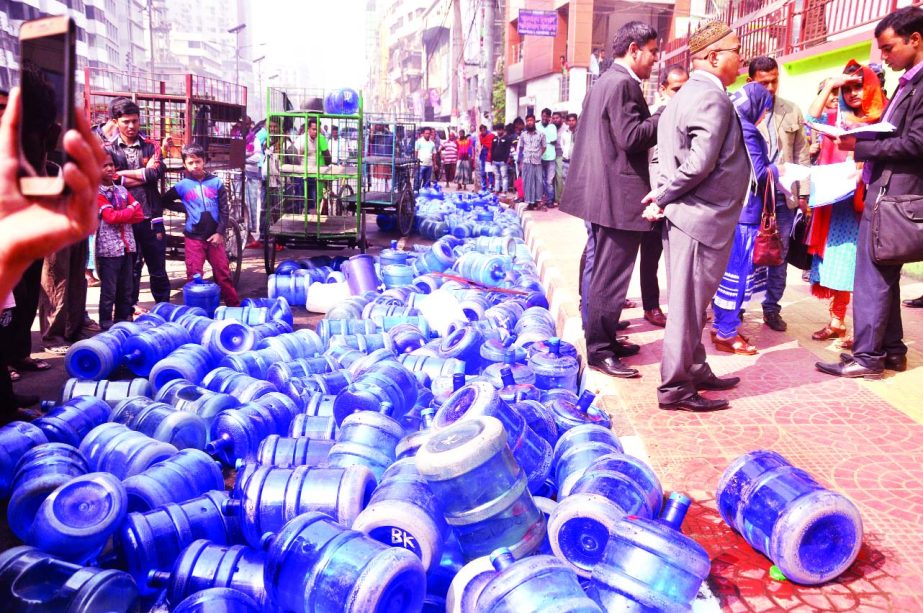
bdnews24.com :
Bangladesh Standards and Testing Institution or BSTI has raided Motijheel and Paltan neighbourhoods in Dhaka to stop sales of ‘filtered’ water jars without its approval.
Ninety-seven percent of these so-called filtered water jars supplied to households, shops and offices in and around the capital contain pathogens from faeces of humans and animals, according to data disclosed in a government report about a month ago.
Until 12pm on Monday, a mobile court led by BSTI Executive Magistrate Nazma Siddiqa found 10 companies guilty of supplying water jars without valid licences from the BSTI.
The mobile court destroyed 600 water jars and seized six vans carrying those to different offices.
Only one out of the 10 companies, Everest Drinking Water, received BSTI approval but it too did not purify the substance duly, said BSTI Assistant Director Arafat Hossain Sarker.
A group of researchers at Bangladesh Agricultural Research Council studied the level of minerals in jars and bottled water in Dhaka in December last year.
The researchers sampled 250 jars from across the city’s Farmgate, Karwan Bazar, Elephant Road, New Market, Chawk Bazar, Sadarghat, Keraniganj, Jatrabari, Motijheel, Basabo, Malibagh, Rampura, Mohakhali, Gulshan, Banani, Uttara, Airport, Dhanmondi, Mohammadpur, Mirpur, Gabtoli, and Aminbazar, Savar and Ashulia.
The level of coliform bacteria in the samples collected from Elephant Road, Chawk Bazar, Basabo, Gulshan and Banani areas was found significantly high in the research.
Coliform bacteria are organisms that are present in the environment and the faeces of all warm-blooded animals and humans.
The bacteria will not likely cause illness. However, their presence in drinking water indicates that disease-causing organisms or pathogens could be in the water system, according to the US Department of Health.
BARC Director Monirul Islam, who headed the research, told this news agency that level of coliforms should be zero in drinkable water.
According to the researchers, BSTI has set the standards of water commercially supplied for drinking, but the business of contaminated water is continuing due to lack of regulation.
Bangladesh Standards and Testing Institution or BSTI has raided Motijheel and Paltan neighbourhoods in Dhaka to stop sales of ‘filtered’ water jars without its approval.
Ninety-seven percent of these so-called filtered water jars supplied to households, shops and offices in and around the capital contain pathogens from faeces of humans and animals, according to data disclosed in a government report about a month ago.
Until 12pm on Monday, a mobile court led by BSTI Executive Magistrate Nazma Siddiqa found 10 companies guilty of supplying water jars without valid licences from the BSTI.
The mobile court destroyed 600 water jars and seized six vans carrying those to different offices.
Only one out of the 10 companies, Everest Drinking Water, received BSTI approval but it too did not purify the substance duly, said BSTI Assistant Director Arafat Hossain Sarker.
A group of researchers at Bangladesh Agricultural Research Council studied the level of minerals in jars and bottled water in Dhaka in December last year.
The researchers sampled 250 jars from across the city’s Farmgate, Karwan Bazar, Elephant Road, New Market, Chawk Bazar, Sadarghat, Keraniganj, Jatrabari, Motijheel, Basabo, Malibagh, Rampura, Mohakhali, Gulshan, Banani, Uttara, Airport, Dhanmondi, Mohammadpur, Mirpur, Gabtoli, and Aminbazar, Savar and Ashulia.
The level of coliform bacteria in the samples collected from Elephant Road, Chawk Bazar, Basabo, Gulshan and Banani areas was found significantly high in the research.
Coliform bacteria are organisms that are present in the environment and the faeces of all warm-blooded animals and humans.
The bacteria will not likely cause illness. However, their presence in drinking water indicates that disease-causing organisms or pathogens could be in the water system, according to the US Department of Health.
BARC Director Monirul Islam, who headed the research, told this news agency that level of coliforms should be zero in drinkable water.
According to the researchers, BSTI has set the standards of water commercially supplied for drinking, but the business of contaminated water is continuing due to lack of regulation.

